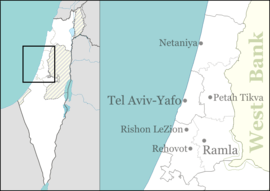El'ad
El'ad, also spelled Elad (Hebrew: אלעד), is a new city in the Center District of Israel, built over the ruins of the depopulated Palestinian village of Al-Muzayri'a.[2] Located about 25 kilometres (16 mi) east of Tel Aviv on Route 444 between Rosh HaAyin and Shoham, it had a population of 47,866 in 2018.[1] El'ad is the only locality in Israel officially designated a religious municipality. The name El'ad means “Forever God”, but it is also named after a member of the tribe of Ephraim, who lived in this area (1 Chronicles 7:21).[3]
El'ad
| |
|---|---|
| Hebrew transcription(s) | |
| • ISO 259 | ʔelˁad |
 Coat of arms | |
 El'ad  El'ad | |
| Coordinates: 32°3′8″N 34°57′4″E | |
| Country | |
| District | Central |
| Founded | 1998 |
| Government | |
| • Type | City (from 2008) |
| • Mayor | Israel (Srulik) Porush (UTJ) |
| Area | |
| • Total | 2,756 dunams (2.756 km2 or 1.064 sq mi) |
| Population (2018)[1] | |
| • Total | 47,866 |
| • Density | 17,000/km2 (45,000/sq mi) |
| Website | http://www.elad.muni.il |
History
.png)
_v2.png)
The building of El'ad started in the late 1990s, following a government decision in 1990 to build a series of settlements along the seam line with the West Bank under then-housing minister Ariel Sharon,[4] and provide immediate housing for 50,000 residents.[5] The town was built from scratch as a planned community according to urban planning paradigms not unlike Modi'in and nearby Shoham. While those towns were designed to suit a mixed population of non-religious and religious Jews, El'ad was originally planned to suit a mixed population of Modern Orthodox/Religious Zionist Jews and ultra-Orthodox Haredi Jews, offering a solution to the acute shortage of affordable housing for Haredi families. The majority of the population are Haredi Jews. Accordingly, El'ad is built in a way that suits their religious lifestyle, with a larger selection of housing options offering larger than average apartments to accommodate religious families, who tend to have more children than the average national population. Another characteristic is easy access and short walking distances to local education institutions to avoid the need for school transportation costs.
By 1998, El'ad had already achieved local council status; in February 2008, El'ad's official status was changed to a city.[6] The city's current mayor is Israel Porush, a member of the United Torah Judaism party.[7]
Demographics
El'ad is one of the fastest-growing towns in Israel, with an annual population growth of 6 to 7 percent. The population density per square kilometer is 13.1,[8] median age is 11.[9]
Economy
The support center of Ramat Gan-based Israeli company Daronet is located in El'ad. Its workers are ultra-Orthodox women. In 2012, Daronet signed a sales agreement worth NIS700,000 (US$180,000) with Saudi energy giant Yanar.[10]
Notable residents
- Eyal Yifrah, 19-year old killed in the 2014 kidnapping and murder of Israeli teenagers
- Avishay Shindler, 24 years old was killed in 2010 by terrorist while driving on a ride as they passed near Bney Naim junction south to Kiryat Arba
References
- "Population in the Localities 2018" (XLS). Israel Central Bureau of Statistics. 25 August 2019. Retrieved 26 August 2019.
- Kadman, Noga (7 September 2015). Erased from Space and Consciousness: Israel and the Depopulated Palestinian Villages of 1948. Indiana University Press. pp. 22–. ISBN 978-0-253-01682-9.
The urban community of El'ad, set up in 1998, has expanded over the site of the village of Al-Muzayri'a
- Bitan, Hanna: 1948-1998: Fifty Years of 'Hityashvut': Atlas of Names of Settlements in Israel, Jerusalem 1999, Carta, p.6, ISBN 965-220-423-4 (Hebrew)
- Shefer, Shlomi (2002-08-05). "A star settlement is born. In these hard economic times, Elad seems to be the only place that's booming as the ultra-Orthodox are flocking to its green spaces and relatively low house prices". Haaretz.
- Greenberg, Harry (19–26 September 2002). "City Development in Israel" (PDF).
- Fendel, Hillel (2008-02-06). "Ten-Year-Old Hareidi-Religious Community of Elad Named a City". Arutz Sheva.
- Ettinger, Yair (2011-12-05). "Ashkenazi and Sephardi rabbis battle over Sabbath hours in Elad". Haaretz.
- "Population and Density per Sq.Km in Localities Numbering 5,000 Residents and more on 31 XII 2009". Israel CBS. 2009-12-31. Archived from the original on 2011-09-21.
- "Population, by population Group, Religion, Age, Sex and Type of Locality, Average 2009". Israel CBS. 2009-12-31. Archived from the original on 2012-02-28.
- Petersburg, Ofer (19 May 2012). "Saudi Oil Giant Partners Up With Israeli Tech Company". Al-Monitor. Yedioth Ahronoth. Retrieved 22 May 2012.
| Wikimedia Commons has media related to El'ad. |